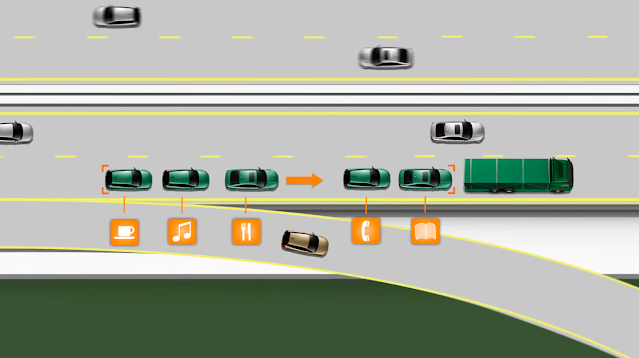Description :
Safe Road Trains for the Environment (SARTRE), funded by the European Commission under the Seventh Framework Programme (FP7), aims to develop strategies and technologies to allow vehicle platoons to operate on normal public highways with significant environmental, safety and comfort benefits.
SARTRE is led by Ricardo UK Ltd and comprimises a collaboration between the following additional participating companies : ApplusIdiada and Robotiker - Tecnalia of Spain, Institut for Kraftfahrwesen Aachen (IKA) of Germany, SP Technical Research Institute of Sweden, Volvo Car Corporation and Volvo Technology of Sweden.
For the first time ever a road train comprising a Volvo XC60, a Volvo V60 and a Volvo S60 plus one truck automatically driving in convoy behind a lead vehicle has operated on a public motorway among other road users. The historic test in Spain was highly successful.
"We covered 200 kilometres in one day and the test turned out well. We're really delighted," says Linda Wahlström, project manager for the SARTRE project at Volvo Car Corporation.
A road train consists of a lead vehicle driven by a professional driver followed by a number of vehicles. Building on Volvo Car Corporation's and Volvo Technology's already existing safety systems - including features such as cameras, radar and laser sensors - the vehicles monitor the lead vehicle and also other vehicles in their immediate vicinity. By adding in wireless communication, the vehicles in the platoon "mimic" the lead vehicle using Ricardo autonomous control - accelerating, braking and turning in exactly the same way as the leader.
Improved Driver Environment - Among Much Else
The project aims to deliver improved comfort for drivers, who can now spend their time doing other things while driving. They can work on their laptops, read a book or sit back and enjoy a relaxed lunch. Naturally the project also aims to improve traffic safety, reduce environmental impact and - thanks to smooth speed control - cut the risk of traffic tailbacks.
Quick Acclimatisation
Sitting in a car just six metres behind another one while travelling at 85 km/h and relying totally on the technology may feel a bit scary. But the experiences gained so far indicate that people acclimatise very quickly.
The three-year SARTRE project has been under way since 2009. All told, the vehicles in the project have covered about 10,000 kilometres. After the test on the public roads in Spain, the project is now entering a new phase with the focus on analysis of fuel consumption.
"We've learnt a whole lot during this period. People think that autonomous driving is science fiction, but the fact is that the technology is already here. From the purely conceptual viewpoint, it works fine and road train will be around in one form or another in the future," says Linda Wahlström.
She Continues...
"We've focused really hard on changing as little as possible in existing systems. Everything should function without any infrastructure changes to the roads or expensive additional components in the cars. Apart from the software developed as part of the project, it is really only the wireless network installed between the cars that set them apart from other cars available in showrooms today."
Are there extra details you’d like to know? Add anything and everything below in the comments! Do share your views and make sure to hit that like button!
Until next time...Stay Tuned! 😊
*by andreascy*
















